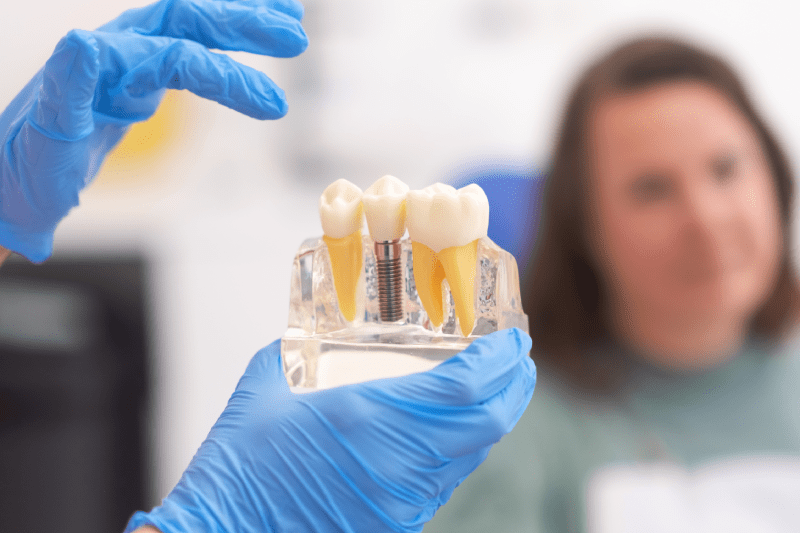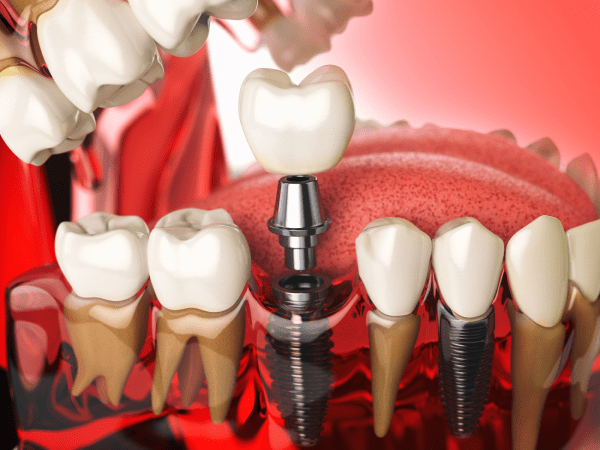What Are Dental Implants and What Do They Do?
Dental implants are artificial tooth roots, usually made of titanium, that are placed into the jawbone to replace missing teeth. These implants provide a solid foundation for the porcelain or zirconia crowns that will be placed on top of them. Implants fill the gap of a missing tooth without harming the adjacent healthy teeth and provide the most natural aesthetics and function. In addition to restoring chewing ability, they also help preserve oral health by preventing jawbone resorption.
Who Can Get Dental Implants?
The most important condition for getting a dental implant is having sufficient jawbone volume and density in the area where the implant will be placed. In general, any healthy individual with good oral hygiene habits can be a suitable candidate for an implant. However, certain systemic conditions such as uncontrolled diabetes, advanced bone loss, or specific blood disorders can make implant treatment risky. Before treatment, your dentist will evaluate your general health and the suitability of your jawbone.
Is Implant Treatment Painful?
Since implant treatment is performed under local anesthesia, no pain is felt during the procedure. The patient may only feel a slight pressure or vibration. After the procedure, there may be some mild swelling or pain. This can be easily managed with pain relievers recommended by the dentist. Patients often state that they feel a discomfort similar to what they would feel after a tooth extraction. In case of unexpected pain or swelling, a dentist should be consulted immediately.
How Long Does the Implant Procedure Take?
The procedure for placing a single implant typically takes a short time, usually 15-30 minutes. If multiple implants are to be placed, this time may be longer. The total duration of the treatment varies depending on the patient’s bone structure, healing speed, and the type of prosthesis to be applied. The integration of the implant with the jawbone (osseointegration) can take 3 to 6 months. Once this process is complete, the prosthetic tooth is placed.
What is the Lifespan of Implants?
A well-maintained dental implant can last a lifetime. The success of the implant depends on the patient’s dedication to oral hygiene, regular dental check-ups, and the absence of harmful habits such as smoking. With proper surgical application and a quality implant material, implants can maintain their initial stability for many years. Poor oral hygiene can lead to inflammation around the implant, causing it to fail.
Is Swelling and Bruising After an Implant Normal?
Mild swelling and bruising after an implant operation are part of the body’s natural healing process and are considered normal. This condition usually subsides on its own within a few days. To minimize swelling, applying a cold compress from the outside for the first 24 hours is recommended. If the swelling and pain increase over time or are still severe after 3-4 days, this could be a sign of infection and a dentist should be consulted immediately.
Who Cannot Get Implant Treatment?
Dental implant treatment cannot be applied to young individuals whose bone development is not yet complete and to those with certain serious systemic conditions. Individuals with uncontrolled diabetes, recent heart attack or stroke, diseases that suppress the immune system, and patients undergoing intensive radiotherapy are in the risk group. Furthermore, since smoking seriously reduces implant success, it is recommended that smoking patients quit this habit before treatment.
How Much Do Dental Implants Cost?
The cost of dental implants varies depending on the brand and quality of the implant used, the number of implants to be placed, additional surgical procedures (bone grafting, sinus lifting, etc.), and the location of the clinic. Low-cost implants may not always be safe. Therefore, when researching prices, it is important to consider the quality of the materials used and the experience of the dentist, rather than just focusing on the cost. You should ask your dentist for a detailed treatment plan and cost breakdown.
How Are Implants Cleaned?
Dental implants, just like natural teeth, should be cleaned regularly and properly. Brushing at least twice a day, using dental floss, and interdental brushes are important. The accumulation of bacterial plaque around the implant can lead to inflammation that can cause implant loss. Therefore, it is necessary to follow the special cleaning techniques recommended by your dentist or hygienist and to not neglect regular check-ups.
How Many Teeth Can Be Made in Implant Treatment?
Implant treatment can be applied to a wide range of situations, from a single missing tooth to an entire toothless mouth. A single implant can be used for one missing tooth, implant-supported bridges for multiple missing teeth, or implants for the entire jaw in a completely toothless mouth. Sometimes, fixed prostheses can be placed on just 4 or 6 implants for the whole jaw. This is planned according to the patient’s oral structure and bone condition.
What Does the Tooth Placed on the Implant Look Like?
The prosthetic tooth placed on the implant is prepared in a laboratory environment to be a perfect match for the shape, color, and size of a natural tooth. These prostheses feel the same as natural teeth in terms of aesthetic appearance and chewing function. Made from durable and aesthetic materials like porcelain or zirconia, these prostheses restore your smile and boost your self-confidence.
Do Implants Cause Allergies?
The titanium used to make dental implants is a metal with high biocompatibility with the human body. Therefore, allergic reactions are extremely rare. Titanium is not perceived as a foreign substance by the body and easily integrates with the bone. Although very rare, some patients may have a titanium sensitivity, but it is possible to perform an allergy test beforehand to detect this condition. For most patients, titanium implants are a safe option.
How Should Nutrition Be After an Implant?
In the first few days immediately after the implant operation, it is necessary to eat soft and lukewarm foods. It is important to avoid hot, hard, and spicy foods during the first few days. As the healing process continues, you can gradually return to a normal diet. It is important not to apply too much pressure on the implant area until the prosthetic tooth is placed. Your dentist will create a specific nutrition plan for you.
Can an Implant Fail?
The success rate of implant treatments is very high, but failure can rarely occur. Reasons for failure include the implant not integrating sufficiently with the bone, infection, poor oral hygiene, smoking, or uncontrolled systemic diseases. In the event of failure, the implant is usually removed, the area is allowed to heal, and an attempt to place a new implant can be made after a certain period.
Is There an Age Limit for Implant Treatment?
There is no upper age limit for implant treatment. Any individual with a suitable health condition and sufficient bone structure can get an implant. However, implants are not applied to young individuals whose bone development is not yet complete (generally under 18 years of age). This is because the position of the implant can change over time as jawbone development continues. For this reason, young patients need to wait until their bone development is complete for an implant.
Do Implants Show Up on a Tomography Scan?
Yes, dental implants are easily visible on imaging methods such as tomography and X-rays. The position, length, and surrounding bone condition of the implants can be clearly evaluated from these images. This feature provides a great advantage for the dentist to monitor the success and condition of the implant. Panoramic X-rays taken during routine check-ups are sufficient for monitoring the implants.
What Are the Types of Dental Implants?
There are many implant brands with different surface properties and designs on the market. The most common implants are endosteal implants, which are screw-shaped and placed into the jawbone. Subperiosteal implants are also available for cases where bone volume is insufficient. The surface structure of the implant is specially designed to accelerate the process of integration with the bone (osseointegration). Your dentist will determine the most suitable type of implant for you.
How Many Stages Does Implant Treatment Consist of?
Implant treatment generally consists of three main stages: The first stage is a surgical procedure to place the implant in the jawbone. The second stage is the 3-6 month healing process, during which the implant fuses with the bone. In the final stage, an impression is taken for the prosthetic tooth to be placed on the implant, and the prosthetic tooth is then placed. If necessary, temporary prostheses can be used until the healing process is complete.
How Reliable is Implant Treatment?
Dental implants are one of the most reliable treatment methods in modern dentistry. Thanks to the biocompatibility of titanium, implants successfully fuse with the jawbone. This treatment method, which has been applied for many years, has been proven with high success rates. Reliability depends on the experience of the dentist, the quality of the implant used, and the patient’s oral hygiene.

What Does the Integration of Implants with the Jawbone Mean?
The integration of implants with the jawbone is called “osseointegration.” This process means that the special coating on the surface of the implant biologically merges with the jawbone cells and forms a strong bond. This connection is critical for the prosthetic tooth placed on the implant to withstand chewing forces. The osseointegration process generally takes 3 to 6 months.
Can You Smoke During Implant Treatment?
Smoking is one of the biggest enemies of implant treatment. Smoking reduces blood flow in the mouth, slowing down the healing process and increasing the risk of infection around the implant. Research shows that the failure rate of implants is much higher in smokers. Therefore, it is extremely important to quit or minimize smoking before and after implant treatment.
Are There Side Effects of Implant Treatment?
The side effects of implant treatment are usually mild and temporary. The most common side effects are mild pain, swelling, and bruising after the procedure. Serious side effects are rare, but conditions such as nerve damage, infection, or damage to adjacent teeth can occur on rare occasions. To prevent such complications, it is very important to choose an experienced dentist and to have proper planning.
How Are Prosthetic Teeth Placed on Implants?
After the implant has fused with the jawbone, a second stage is initiated to place the prosthetic tooth. In this stage, a part called an “abutment” is placed on the implant. The abutment serves as a connector between the prosthetic tooth and the implant. The dentist then fixes the porcelain or zirconia crown, which has been prepared to match your natural tooth, onto the abutment. This procedure is usually completed in a few sessions.
When Can Implant Treatment Be Started?
The ideal time to apply an implant after a tooth extraction is when the extraction site has healed. In most cases, an implant can be placed within 2-3 months after tooth extraction. However, if sufficient bone is available, an implant can also be placed in the same session as the tooth extraction (immediate implant). This is decided based on a detailed examination and imaging by the dentist.
Do Implants Feel Like Real Teeth?
Dental implants are the closest solution to natural teeth in terms of function and aesthetics. After a properly planned and executed implant treatment, the implants feel like real teeth in the mouth. The chewing function is completely restored, and the patient can use their implanted tooth like a natural tooth. This prevents any restrictions on daily activities such as speaking and eating.
Can You Fast During Implant Treatment?
Since implant treatment is a surgical procedure, it is not religiously recommended to perform it while fasting. The religious rulings on this matter may vary depending on the nature of the procedure and the patient’s condition. However, since it is necessary to take water and medication orally, most religious scholars may consider such surgical procedures to be among the things that invalidate the fast. For the most accurate information, it is more appropriate to postpone such procedures until after the fast or to consult the current fatwas of the Presidency of Religious Affairs.
What Specialization is Required for a Dental Implant?
Dental implant treatment is generally performed by Oral and Maxillofacial Surgeons or Periodontologists who specialize in implant surgery. These specialists have received special training in surgical operations related to the jawbone and soft tissues. However, experienced general dentists can also perform implant procedures. Therefore, when choosing a dentist, you should definitely research the dentist’s experience in the implant field and their references.
Do Implant Teeth Decay?
Dental implants do not decay because they are made of metal. However, the gums and bone around the implant can become inflamed, just as they can with natural teeth. This condition is called “peri-implantitis” and can cause the implant to lose its bone support. For this reason, regular and proper cleaning of implants is vital for the health of the surrounding tissues, even if they do not decay.
What Are the Most Common Mistakes in Implant Treatment?
The most common mistakes in implant treatment are placing an implant despite insufficient bone volume, performing the operation in a non-sterile environment, choosing the wrong implant size, the patient not paying attention to oral hygiene, and continuing to smoke. These mistakes can lead to implant failure. Proper planning, an experienced dentist, and patient cooperation are essential for a successful treatment.
Do Implant Teeth Prevent Jawbone Resorption?
Yes, dental implants help prevent jawbone resorption. A missing tooth gap causes the jawbone to resorb over time. When implants are placed in the jawbone, they stimulate the bone cells, which helps preserve bone density and prevents bone resorption. This also prevents the deterioration of facial aesthetics.
Why Should I Choose Turkey for Dental Implants?
Turkey stands out in dental implant treatments with its high-quality standards, state-of-the-art clinic equipment, and economic price advantage, especially compared to Europe and North America. Dentists in the country are internationally trained and experienced. Treatment costs, even when including travel and accommodation expenses, are generally lower than the prices in your home country. This makes Turkey an attractive destination for health tourism.
How Much Do Dental Implants Cost in Turkey?
The prices of dental implants in Turkey vary greatly depending on the implant brand, the number of implants to be placed, additional surgical procedures (bone grafting, sinus lifting, etc.), and the location of the clinic. However, in general, the costs in Turkey are between 50% and 70% lower than in Western European countries. This price advantage stems from more affordable living and labor costs. To get a clear idea of prices, it is best to contact the clinic you choose directly.
How Reliable are Dental Clinics in Turkey?
Many dental clinics in Turkey provide services at international standards and invest in modern technology. Choosing a reliable clinic is possible by preferring institutions that have health tourism certificates, international patient references, and transparently share the experience of their dentists. It is important to inquire about the clinics’ sterilization procedures, the implant brands used, and the dentist’s area of expertise.
How Should I Prepare Before Starting Treatment?
Before starting treatment, you should first send your panoramic X-rays or dental tomography images to your dentist for a detailed online consultation. Your dentist will create a personalized treatment plan for you based on these images. This plan should include the treatment duration, the number of trips required, and an approximate cost. It is also important to inform your doctor about your general health condition.
Which Cities in Turkey Are Popular for Dental Implants?
Among the most popular cities for dental implants and health tourism in Turkey are Istanbul, Izmir, and Antalya. These cities are home to a large number of qualified dental clinics and also offer a wide range of tourist attractions. Patients get the opportunity to explore historical and natural beauties after completing their treatment. Different price and service quality options may be found in each city.
What Implant Brands Are Used in Turkey?
Clinics in Turkey generally use many different implant brands that have proven themselves internationally and have FDA approval. These brands include global leaders such as Straumann, Nobel Biocare, and Osstem. There are also reliable Turkish brands that produce locally. Your clinic will recommend the brand that is most suitable for your budget and bone structure and will provide detailed information on this matter.
How Long Does the Total Treatment Take?
The total duration of implant treatment varies depending on the patient’s condition. While placing a single implant usually takes 15-30 minutes, the fusion of the implant with the jawbone (osseointegration) can take 3 to 6 months. If additional procedures such as bone grafting are required, this period may be longer. For a complete treatment, it may be necessary to travel to Turkey more than once.
Who Arranges Accommodation and Transportation?
Many health tourism clinics in Turkey offer a ‘package’ service for international patients. These packages usually include airport transfers, hotel reservations, and all local transportation during the treatment. This way, patients do not have to deal with travel and accommodation planning and can focus solely on their treatment. It is important to ask in advance if this service is included in the treatment package.
Do I Need a Visa?
Whether you need a visa to travel to Turkey depends on your country of citizenship. Citizens of many countries can enter Turkey visa-free for up to 90 days. However, a visa is mandatory for some countries. To get the most up-to-date visa information, you can visit the official website of the Ministry of Foreign Affairs of the Republic of Turkey or get support from your clinic coordinator.
Do Turkish Dentists Speak English or Other Languages?
Many dentists and clinic staff working in the health tourism sector in Turkey speak fluent English. Some clinics also have staff who can provide services in languages such as German, French, Russian, or Arabic. It is of great importance to choose a clinic where communication is easy to prevent a language barrier during the treatment process.
Are There Risks in Getting an Implant in Turkey?
Dental implant treatment, like any surgical procedure, carries certain risks. These risks are not unique to Turkey and exist in every country. The most common risks include infection, bleeding, and nerve damage. However, these risks are minimized in procedures performed by an experienced surgeon who adheres to hygiene rules and uses modern equipment.
How Will I Handle My Post-Treatment Check-ups?
Post-treatment check-ups for dental implant treatment in Turkey are usually done by a dentist in the patients’ home countries. Many Turkish clinics facilitate this process by collaborating with dentists in the patients’ home countries. In addition, clinics often offer communication channels for remote consultations and virtual check-ups.

How Many Times Do I Need to Travel to Turkey for Implant Treatment?
For a standard implant treatment, two trips are usually sufficient. In the first trip, the implants are placed, and the healing process is awaited. This process usually takes 3-6 months. In the second trip, the prosthetic teeth are placed on the implants. If additional procedures such as bone grafting are needed, the number of trips may increase.
Is There a Warranty for Implants in Turkey?
Many reputable dental clinics provide a certain warranty period for dental implants. This warranty may be related to the implant itself or the craftsmanship of the prosthetic tooth. The warranty conditions vary depending on the clinic and the brand used. Before starting treatment, you must clarify the scope of the warranty, its duration, and the conditions under which it is valid.
Can I Take a Vacation While Getting an Implant?
Yes, this is one of the biggest advantages of health tourism. Dental implant treatment in Turkey is usually completed within a few days. You can use this short time before or after the operation to rest, and visit the historical and cultural sites of the city. By planning in advance with the clinic, you can combine both treatment and vacation.
Are Airport Transfers Provided?
Most health tourism clinics offer airport transfer services for their international patients. This service makes it easy for patients to travel from the airport to the hotel and from the clinic to the hotel. This way, patients do not experience any problems with transportation in a foreign city. It is important to ask in advance if the transfer service is included in the treatment package.
Is Online Consultation Possible Before Treatment?
Many dental clinics in Turkey offer free online consultation services for international patients. These consultations can be conducted via video call or email. During the online consultation, the patient’s submitted X-rays are examined, and a preliminary treatment plan is created. This allows the patient to get a clear idea about the treatment before coming to Turkey.
What Technologies Do Clinics in Turkey Use?
Modern dental clinics in Turkey widely use advanced technologies such as computer-aided design (CAD/CAM), 3D tomography (CBCT), and digital impression taking. These technologies make treatment planning more precise, shorten the procedure time, and increase treatment success. This shows that dentistry in Turkey is at international standards.
Will I Feel Pain During the Treatment?
Since the implant placement procedure is performed under local anesthesia, you will not feel any pain or discomfort during the procedure. You may only feel a slight pressure or vibration. The mild pain and swelling that may occur after the procedure can be easily controlled with pain relievers prescribed by your dentist.
How Far in Advance Should I Book My Implant Treatment?
It is recommended to book your appointment at least 1-2 months in advance, as there is often high demand, especially during the summer and holiday seasons. This is important both to ensure the clinic’s availability and to make your travel and accommodation planning more comfortable. Some clinics can provide appointments on shorter notice for emergency cases.
Which Clinics in Turkey Have a Health Tourism Certificate?
In Turkey, a health tourism certificate is given to clinics that meet the criteria set by the Ministry of Health and are authorized to accept international patients. This certificate is an indicator of the clinic’s quality and safety standards. When choosing a clinic, inquiring whether it has this certificate on its website or through the patient coordinator will help you make a safe choice.
How Much Money Should I Save for the Treatment?
Your treatment cost will vary depending on the scope of the procedures to be performed. While the average cost of a single implant is lower than in other countries, additional procedures such as multiple implants, bone grafting, or sinus lifting can increase the cost. Clinics generally provide you with a personalized cost breakdown after finalizing the treatment plan.
Are Implants in Turkey Covered by European Insurance?
Health insurances in Europe or other countries generally do not cover dental treatments performed abroad. However, some private insurance companies may cover part or all of the costs of overseas treatments. It is important to clarify this issue with your insurance company before starting treatment.
How Can I Choose My Dentist?
When choosing a dentist, you should pay attention to the dentist’s area of expertise, experience, similar cases they have done before, and patient reviews. It is important to review patient references with photos and to get information about the implant brands the dentist uses. In addition, choosing a dentist and a clinic that gives you confidence and patiently answers all your questions is also important.
Do I Need to Follow a Special Diet for Treatment?
It is recommended to eat soft and lukewarm foods for the first few days immediately after the implant operation. You should avoid hard, hot, and spicy foods that would negatively affect the healing process. Your dentist will give you detailed instructions about your diet after the operation.
What Documents Are Required for Implant Treatment?
For your implant treatment in Turkey, your passport and, if necessary, your visa are usually sufficient. In addition, bringing any existing X-rays, tomographies, and documents containing your health history will facilitate treatment planning. Clinics usually request these documents in advance.
What are the Main Advantages of Getting an Implant in Turkey?
The main advantages of getting an implant in Turkey are, in addition to the affordable cost, high-quality treatment, state-of-the-art equipment, internationally accredited dentists and clinics, the opportunity for a tourist trip, and the comprehensive services offered by treatment packages. These advantages make Turkey an attractive option for implant treatment.
How is Travel and Treatment Planned?
Travel and treatment planning are generally done by the clinic through a patient coordinator. First, a preliminary treatment plan is created with the medical images you provide. Then, the operation and accommodation plan are made according to your travel dates. All details, such as airport transfers, hotel reservations, and clinic appointments, are arranged by the patient coordinator.
Is Implant Treatment Legal in Turkey?
Yes, dental implant treatment in Turkey is a legal procedure performed by licensed and authorized dentists in accordance with the standards set by the Ministry of Health. The country has made the necessary legal arrangements to support health tourism and has created a reliable framework in this field.



